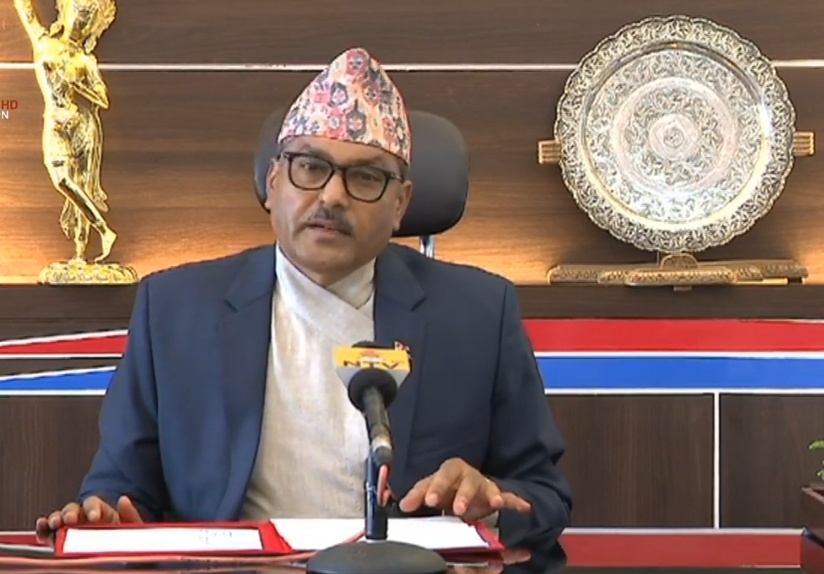Nepal Inc upbeat as NRB unveils borrower-friendly Monetary Policy
KATHMANDU, JULY 17
Unveiling the Monetary Policy for fiscal year 2020-21 today, Nepal Rastra Bank has adopted a policy to revive the COVID-affected economy by promoting loan disbursement in sectors hit by the crisis, especially agriculture, energy, tourism and small and medium enterprises.
The Monetary Policy has also revised the minimum investment (in terms of loans) that banks and financial institutions should make in priority sectors while it has also widened the range of refinancing facility to ensure increased access of businesses to such subsidised loans. While commercial banks have been made to invest at least 15 per cent of their overall loan portfolio till mid-July 2023 in the agriculture sector, banks now are also required to invest at least 10 per cent of their loan portfolio till mid-July 2024 in the energy sector.
In a bid to help revive businesses hit hard by the coronavirus, the central bank has also made it mandatory for banks to disburse subsidised loans, which are available at five per cent. While commercial banks are required to disburse such loans to at least 500 borrowers or at least 10 such loans per bank branch, development banks have been compelled to float subsidised loans to at least 300 borrowers or at least to five borrowers per bank branch, whichever is more.
NRB has also extended the loan and interest rate payment period for borrowers, especially businesses, to up to two years, depending on the level of impact that COVID-19 has had on different sectors. In the case of industry or projects that could not be completed within the grace period due to the pandemic, especially star hotels, the central bank has given two years' time to clear loans and interests. While NRB has set a moratorium on principal and interest payments for borrowers severely affected during the current crisis till mid-July 2021 (one year), such moratorium for partially affected borrowers has been set for mid-April 2021 (nine months).
Likewise, moratorium to borrowers in sectors which had limited impact due to COVID-19 has been set till mid-January 2021 (six months).
The central bank has also tried addressing the interest rate issue being raised by the business community.
Through the Monetary Policy, it has halted issuance of new licences to finance companies while also capped interest rate on loans issued by such companies to 15 per cent or less.
NRB has raised the credit to core capital plus deposit (CCD) ratio — the limit till which banks are allowed to issue loans and advances — for banks to 85 per cent from existing 80 per cent to boost the capacity of banks to invest. It has also raised the limit on loans acquired through share as collateral by five percentage points to 70 per cent.
However, the central bank has barred banks and financial institutions from charging excessive service fee. While commercial banks can now take only 0.75 per cent service charge while issuing loans, development banks and finance companies can take only one per cent and 1.25 per cent service charge from borrowers, respectively.
The central bank has also decided to review salary/facilities of bankers and cut their allowances.
NRB has also announced to halt issuing licence to new digital payment service providers and scrap the licence of those service providers failing to expand their consumer base to 300,000 by mid-July next year and those that fail to conduct monthly transactions worth Rs 600,000 on an average.
Meanwhile, NRB has also opened the door for banks to issue energy and agriculture bonds which can also have investment from farmers and hydropower developers.
Though banks had started charging the public for interbank ATM withdrawal since July 16, the NRB has barred banks from charging the public for interbank ATM withdrawal till the COVID-19 crisis exists.
The central bank has also promoted mega mergers between banks and financial institutions and ensured different facilities to entities that go for the merger and acquisition process. It has announced to allow merged entities to collect 10 per cent more corporate deposits than the fixed cap. Similarly, the cooling period will not be applicable for promoters and chief executive officers of the merged entities.
Meanwhile, the business community has overwhelmingly welcomed the Monetary Policy stating that NRB has incorporated a majority of its demands and recommendations.
However, it has urged the central bank to effectively implement all Monetary Policy provisions.
Subsidised loans
- NRB has made it mandatory for banks to disburse subsidised loans, which are available at five per cent
- The central bank has barred BFIs from charging excessive service fee
- The central bank has also decided to review salary / facilities of bankers and cut their allowances
A version of this article appears in e-paper on July 18, 2020, of The Himalayan Times.






